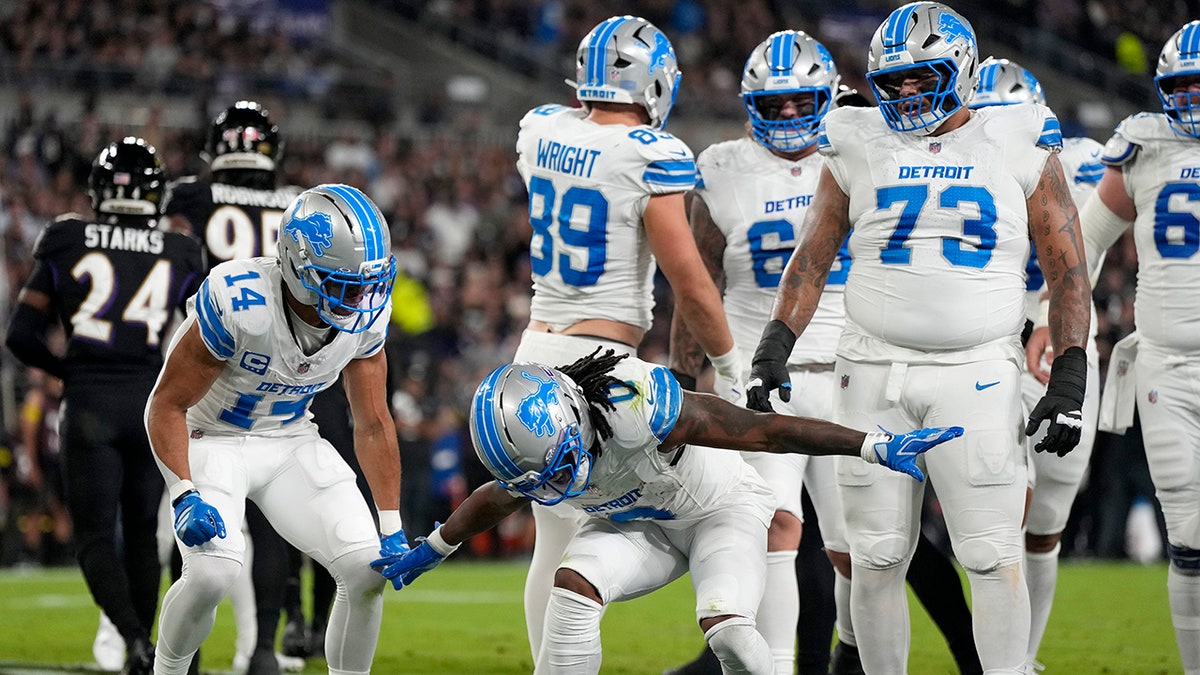NEWYou can now listen to Fox News articles!
The Detroit Lions went into Baltimore on Monday night and came away with a high-scoring victory, 38-30, over the Ravens.
The Lions moved to 2-1, while the Ravens are now 1-2 after faltering late in this game.
Being that these are two of the most explosive offenses in the NFL to start the new year, it was expected to be a shootout at M&T Bank Stadium, and that’s exactly what football fans got from the Ravens and Lions.
CLICK HERE FOR MORE SPORTS COVERAGE ON FOXNEWS.COM

Jahmyr Gibbs of the Detroit Lions celebrates scoring a touchdown against the Baltimore Ravens during the first quarter at M&T Bank Stadium on Sept. 22, 2025 in Baltimore, Maryland. (Jess Rapfogel/Getty Images)
It was Detroit getting on the board first with its opening drive, going 11 plays and 67 yards with Jahmyr Gibbs finding the end zone for the first time on the night with a one-yard run. But the Ravens’ opening-drive script was even better thanks to their Pro Bowl running back.
Derrick Henry, who had just 23 yards rushing in the win over the Cleveland Browns last week, broke that mark with a 28-yard touchdown run to even the score after the extra point.
After punts by both teams on their next drives, the Lions found themselves on their own two-yard line late in the first quarter. Baltimore was hoping to make it a quick punt given the circumstances, but Detroit was simply better at the line of scrimmage as they stayed true to the run game and managed to go 98 yards in 18 plays for a touchdown.
BROWNS STUN PACKERS WITH DRAMATIC WALK-OFF FIELD GOAL IN MASSIVE UPSET AT HOME
It was David Montgomery, Gibbs’ counterpart in the backfield, punching it in to cap a drive that took just under 11 minutes of first-half clock off the board to make it 14-7.
It appeared momentum would totally be on the Lions’ sideline, especially after being able to stop the Ravens near the goal line on four tries to get a turnover on downs. However, Lamar Jackson and company were able to tie things at 14 apiece with 24 seconds left in the second quarter after Rashod Bateman was found wide open in the front of the end zone.
As the second half began, Baltimore got right to work, going 11 plays and 73 yards where Jackson threw a seed to tight end Mark Andrews for the touchdown lead. But just like in the first half, Detroit had the answer with a touchdown of their own, as Goff placed the ball perfectly to Amon-Ra St. Brown, who was streaking down the right sideline into the end zone.

David Montgomery of the Detroit Lions runs the ball against the Baltimore Ravens during the second quarter at M&T Bank Stadium on Sept. 22, 2025 in Baltimore, Maryland. (Greg Fiume/Getty Images)
At 21 apiece entering the fourth quarter, and both offenses clearly clicking, this game felt like it was going to come down to the wire. The Lions got their lead back after a gadget play on fourth-and-1 from the Baltimore four-yard line, as St. Brown flipped it back to Gibbs for the score.
The Ravens were able to get a field goal and a timely punt, as they had 8:31 left in the fourth quarter and a four-point deficit to overcome. But Henry fumbled on the first play, as Aidan Hutchinson punched the ball out from behind.
Luckily, a facemask penalty by a Lions offensive lineman stalled a potential game-sealing drive, with Detroit forced to have Jake Bates nail a field goal to get their seven-point lead back.
Jackson and the Ravens needed another answering score, but the Lions’ defense was relentless and forced a three-and-out as the defensive front just kept getting Jackson down to the turf – something we’re certainly not used to seeing.
The Lions were able to sack Jackson seven times, with Al-Quadin Muhammad getting 2.5, while Hutchinson, Derrick Barnes, Trevor Nowaske and Jack Campbell each tallied one.
Detroit had the opportunity to seal their victory after forcing the punt, and they didn’t just get necessary first downs. Montgomery, who led the game with 151 yards rushing on 12 carries went 31 yards to the house to make it a 38-24 game.
The Lions also went for it on fourth down the play prior to the score, with Goff placing another great pass for St. Brown to not only keep the drive going, but not give Jackson the ball at midfield. Goff finished the game 20-of-28 for 202 yards with St. Brown leading the Lions with 77 yards on seven catches.
Detroit also had 225 rushing yards, with Gibbs going for 67 on 22 carries while also catching five passes for 32 yards.

Jared Goff of the Detroit Lions celebrates after a touchdown during an NFL football game against the Baltimore Ravens at M&T Bank Stadium on Sept. 22, 2025 in Baltimore, Maryland. (Michael Owens/Getty Images)
CLICK HERE TO GET THE FOX NEWS APP
For the Ravens, they had a touchdown drive with just seconds left on the clock, but it was too little too late in the end.
Jackson finished 21-of-27 for 288 yards with three touchdown passes, two of which going to Andrews who led the game with 91 receiving yards on six catches. Henry was held to just 50 yards on 12 carries as well.
Follow Fox News Digital’s sports coverage on X, and subscribe to the Fox News Sports Huddle newsletter.

